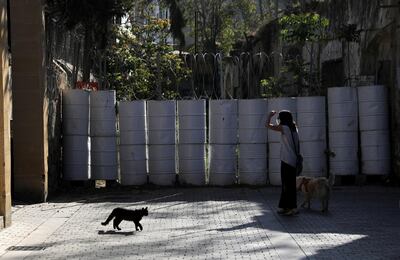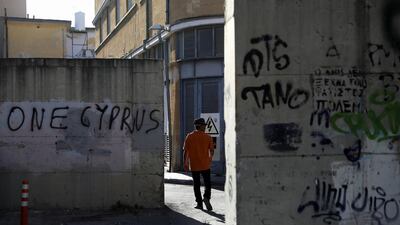Britain is expected to emphasise the potential a united Cyprus can offer economically and for the region's stability, as talks resume on a lasting solution for the divided island on Tuesday.
The breakaway north and its ally Turkey want a two-state set-up for the Eastern Mediterranean island, whereas the Greek-Cypriot south and most of the international community favour a settlement based on a bi-communal, bi-zonal federation with political equity.
After a four-year hiatus, officials will endeavour to find common ground at the UN-hosted informal meeting in Geneva, after decades of division.
Greece, Turkey and the UK – from which Cyprus gained independence in 1960 – are also present.
UN Secretary General Antonio Guterres will oversee the talks.
"This is an issue that he knows well. He has participated in discussions before. So he is realistic," said Stephane Dujarric, a spokesman for Mr Guterres.
Ersin Tatar, leader of the administration in northern Cyprus, is urging the UK to recognise the Turkish-Cypriot half of the island as an independent country – something only Turkey does.
But it’s understood the UK’s long-standing policy of non-recognition of the Turkish Republic of Northern Cyprus is not under review and that Britain remains a strong supporter of a solution based on the UN Security Council’s federal model.
Speaking before the Geneva talks, UK Foreign Secretary Dominic Raab said the meeting offered “an opportunity to restart negotiations aimed at delivering a fair and lasting solution to the Cyprus issue, and we hope that all parties approach them with creativity and flexibility”.
Mr Raab is expected to outline how the UK believes that a reunited Cyprus would offer significant economic benefits through trade, tourism, investment and potential energy partnerships.
Cypriot President Nicos Anastasiades said his delegation was eager to find a way to "restart substantive negotiations".
"I hope the other side will come with the same will and the same evaluation, because any diversion will not only be at the expense of the Greek Cypriots, but also to the detriment of the Turkish Cypriots," Mr Anastasiades said.
After nearly 50 years of division, both sides of Cyprus appear more entrenched than ever.
Mr Tatar is a vocal proponent of a two-state solution and believes it is the only realistic way forward.
After meeting Mr Tatar in Ankara on Monday, Turkey’s President Recep Tayyip Erdogan said he fully supported the two-state proposal.

Greek-Cypriots say they will never accept the plan because it would forever legitimise the country’s partition.
Cyprus has been divided since 1974, after Turkey invaded the northern half of the island in response to a Greek-inspired coup.
Further complicating the situation are maritime border disputes and energy exploration in the Eastern Mediterranean between Cyprus and Greece on one hand, and Turkey on the other.


